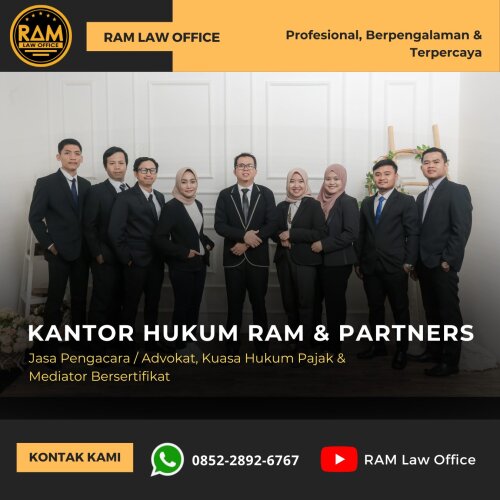Best Restructuring & Insolvency Lawyers in Indonesia
Share your needs with us, get contacted by law firms.
Free. Takes 2 min.
Or refine your search by selecting a city:
List of the best lawyers in Indonesia
About Restructuring & Insolvency Law in Indonesia
Restructuring and insolvency law in Indonesia provides the legal frameworks and procedures for companies and individuals facing financial difficulties. The law aims to help businesses restructure their debts and continue operations or, if that is not possible, to resolve their financial obligations through a formal insolvency process. The central piece of legislation governing this field in Indonesia is Law No. 37 of 2004 regarding Bankruptcy and Suspension of Debt Payment Obligations (locally known as PKPU). This law outlines how debtors and creditors can seek legal remedies in cases of insolvency and provides mechanisms for either restructuring or liquidation.
Why You May Need a Lawyer
There are many situations in which businesses or individuals may need legal assistance with restructuring and insolvency in Indonesia. If you are a business owner facing financial distress, need to negotiate with creditors, or are considering filing for bankruptcy, the legal procedures can be complex. Lawyers can also help creditors recover debts or safeguard their interests during an insolvency process. Common scenarios include:
- Seeking protection from creditors through the PKPU (Suspension of Debt Payment Obligations) process.
- Negotiating debt restructuring agreements with creditors to avoid insolvency.
- Filing for bankruptcy due to insolvency or inability to pay debts.
- Advising on asset protection and risk management during financial distress.
- Assisting creditors in submitting claims or joining insolvency proceedings.
- Representing parties in court or mediation during disputes related to debt or bankruptcy.
- Identifying fraud or improper conduct during the restructuring or insolvency process.
Local Laws Overview
Indonesia's main insolvency and restructuring laws are designed to protect the interests of debtors and creditors while ensuring a clear process for resolving debts. Key aspects include:
- PKPU (Penundaan Kewajiban Pembayaran Utang): This is a court-supervised process that allows debtors (individuals or companies) to negotiate with creditors for a temporary suspension of debt payments and to try to reach a restructuring agreement.
- Bankruptcy Proceedings: Any creditor with a valid and due claim can file for bankruptcy against a debtor. The court will consider the petition and, if it meets requirements, declare bankruptcy and appoint a curator to manage the bankruptcy estate.
- Curators and Supervisors: In both PKPU and bankruptcy cases, the court appoints curators (administrators) and supervisors to oversee the process and ensure fair treatment for all parties.
- Creditor Meetings: Important decisions about the restructuring plan or liquidation are made through creditor meetings managed by the curator and supervised by the court.
- Asset Distribution: In bankruptcy, assets are sold and distributed among creditors according to their priority under the law.
- Cross-Border Aspects: Indonesia’s insolvency laws can be complex in cross-border cases, particularly where foreign creditors or assets are involved.
Frequently Asked Questions
What is the PKPU process?
PKPU, or Suspension of Debt Payment Obligations, is a legal process that allows debtors in Indonesia to temporarily halt debt repayments while they negotiate with creditors. The goal is to reach an agreement on restructuring the debts without going into bankruptcy.
Who can file for bankruptcy in Indonesia?
Both individuals and legal entities (including companies) can file for bankruptcy or be petitioned into bankruptcy by their creditors if they have at least two creditors and a debt that is due and unpaid.
What is the difference between restructuring and bankruptcy?
Restructuring refers to reorganizing a company’s financial obligations to restore its viability, often through negotiation with creditors. Bankruptcy is a legal process where a debtor’s assets are liquidated and distributed to creditors when debts cannot be repaid.
Can a foreign creditor file for bankruptcy against an Indonesian company?
Yes, foreign creditors can file for bankruptcy in Indonesia, subject to the same legal requirements as domestic creditors.
How long does the PKPU process take?
The initial PKPU period typically lasts 45 days and can be extended up to a maximum of 270 days with court approval, depending on creditor agreement and the specifics of the case.
What are the consequences of bankruptcy for a company?
Once declared bankrupt, a company’s management loses control over its assets, which are managed by a court-appointed curator, and the company may ultimately be liquidated.
Can individuals apply for debt restructuring or PKPU?
Yes, both individuals and businesses can apply for PKPU if they are facing financial difficulties and seek to reach an arrangement with their creditors.
What protections does the PKPU process offer to debtors?
While under PKPU, debtors are protected from legal actions by creditors, such as asset seizures or debt collection lawsuits, giving them space to negotiate a restructuring plan.
What is the role of the commercial court?
The commercial court in Indonesia has jurisdiction over PKPU and bankruptcy cases. It reviews petitions, appoints curators and supervisors, oversees meetings, and makes key rulings throughout the process.
How are creditors paid in a bankruptcy?
After a company is declared bankrupt and its assets are sold, funds are distributed by priority: secured creditors, preferential creditors (such as employees), and then unsecured creditors, according to the law.
Additional Resources
If you need further information or assistance, consider contacting or consulting the following resources and organizations in Indonesia:
- Commercial Courts (Pengadilan Niaga) in major Indonesian cities
- Otoritas Jasa Keuangan (OJK) - Indonesia Financial Services Authority, which also provides oversight in financial sector restructuring
- Indonesian Receivers and Administrators Association (AKPI)
- Ministry of Law and Human Rights for official regulations and guidance
- Indonesian Bar Association (PERADI) for referrals to specialized restructuring and insolvency lawyers
- Chambers of commerce and industry groups for support and seminars
Next Steps
If you believe you need legal assistance for restructuring or insolvency matters in Indonesia, begin by gathering documentation of your financial position, including contracts, accounts, and correspondence with creditors. Consult with a licensed Indonesian lawyer who specializes in insolvency or commercial law. They can assess your situation and help you understand your rights and options. You should act quickly, especially if you believe your business is at risk, to maximize the chance of a positive outcome and protect your assets and interests.
Always ensure your legal representative is experienced in Indonesian restructuring and insolvency cases. A lawyer can help you determine whether restructuring or bankruptcy is the most appropriate solution, guide you through the court processes, negotiate with creditors, and help you comply with all legal requirements.
Lawzana helps you find the best lawyers and law firms in Indonesia through a curated and pre-screened list of qualified legal professionals. Our platform offers rankings and detailed profiles of attorneys and law firms, allowing you to compare based on practice areas, including Restructuring & Insolvency, experience, and client feedback.
Each profile includes a description of the firm's areas of practice, client reviews, team members and partners, year of establishment, spoken languages, office locations, contact information, social media presence, and any published articles or resources. Most firms on our platform speak English and are experienced in both local and international legal matters.
Get a quote from top-rated law firms in Indonesia — quickly, securely, and without unnecessary hassle.
Disclaimer:
The information provided on this page is for general informational purposes only and does not constitute legal advice. While we strive to ensure the accuracy and relevance of the content, legal information may change over time, and interpretations of the law can vary. You should always consult with a qualified legal professional for advice specific to your situation.
We disclaim all liability for actions taken or not taken based on the content of this page. If you believe any information is incorrect or outdated, please contact us, and we will review and update it where appropriate.
Browse restructuring & insolvency law firms by city in Indonesia
Refine your search by selecting a city.
















